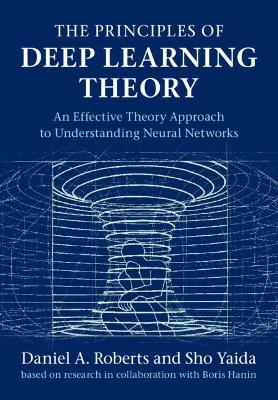
The Principles of Deep Learning Theory
Cambridge University Press (Verlag)
978-1-316-51933-2 (ISBN)
This textbook establishes a theoretical framework for understanding deep learning models of practical relevance. With an approach that borrows from theoretical physics, Roberts and Yaida provide clear and pedagogical explanations of how realistic deep neural networks actually work. To make results from the theoretical forefront accessible, the authors eschew the subject's traditional emphasis on intimidating formality without sacrificing accuracy. Straightforward and approachable, this volume balances detailed first-principle derivations of novel results with insight and intuition for theorists and practitioners alike. This self-contained textbook is ideal for students and researchers interested in artificial intelligence with minimal prerequisites of linear algebra, calculus, and informal probability theory, and it can easily fill a semester-long course on deep learning theory. For the first time, the exciting practical advances in modern artificial intelligence capabilities can be matched with a set of effective principles, providing a timeless blueprint for theoretical research in deep learning.
Daniel A. Roberts was cofounder and CTO of Diffeo, an AI company acquired by Salesforce; a research scientist at Facebook AI Research; and a member of the School of Natural Sciences at the Institute for Advanced Study in Princeton, NJ. He was a Hertz Fellow, earning a PhD from MIT in theoretical physics, and was also a Marshall Scholar at Cambridge and Oxford Universities. Sho Yaida is a research scientist at Meta AI. Prior to joining Meta AI, he obtained his PhD in physics at Stanford University and held postdoctoral positions at MIT and at Duke University. At Meta AI, he uses tools from theoretical physics to understand neural networks, the topic of this book. Boris Hanin is an Assistant Professor at Princeton University in the Operations Research and Financial Engineering Department. Prior to joining Princeton in 2020, Boris was an Assistant Professor at Texas A&M in the Math Department and an NSF postdoc at MIT. He has taught graduate courses on the theory and practice of deep learning at both Texas A&M and Princeton.
Preface; 0. Initialization; 1. Pretraining; 2. Neural networks; 3. Effective theory of deep linear networks at initialization; 4. RG flow of preactivations; 5. Effective theory of preactivations at initializations; 6. Bayesian learning; 7. Gradient-based learning; 8. RG flow of the neural tangent kernel; 9. Effective theory of the NTK at initialization; 10. Kernel learning; 11. Representation learning; ∞. The end of training; ε. Epilogue; A. Information in deep learning; B. Residual learning; References; Index.
| Erscheinungsdatum | 27.04.2022 |
|---|---|
| Co-Autor | Boris Hanin |
| Zusatzinfo | Worked examples or Exercises |
| Verlagsort | Cambridge |
| Sprache | englisch |
| Maße | 184 x 261 mm |
| Gewicht | 1060 g |
| Themenwelt | Informatik ► Theorie / Studium ► Künstliche Intelligenz / Robotik |
| Naturwissenschaften ► Physik / Astronomie ► Thermodynamik | |
| ISBN-10 | 1-316-51933-3 / 1316519333 |
| ISBN-13 | 978-1-316-51933-2 / 9781316519332 |
| Zustand | Neuware |
| Haben Sie eine Frage zum Produkt? |
aus dem Bereich


